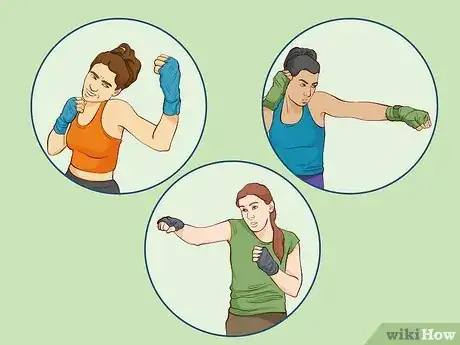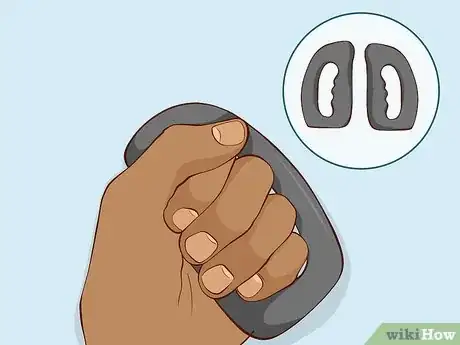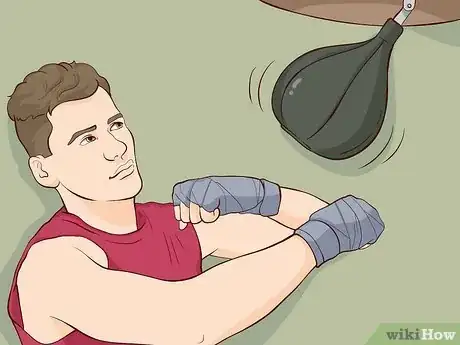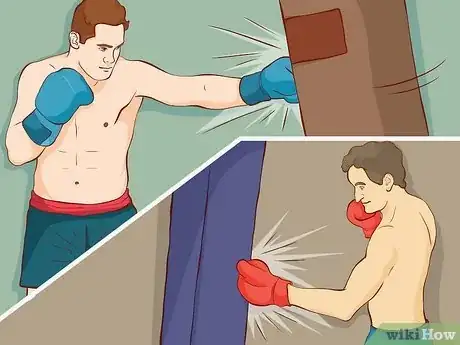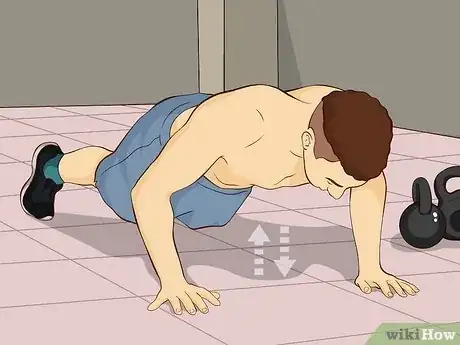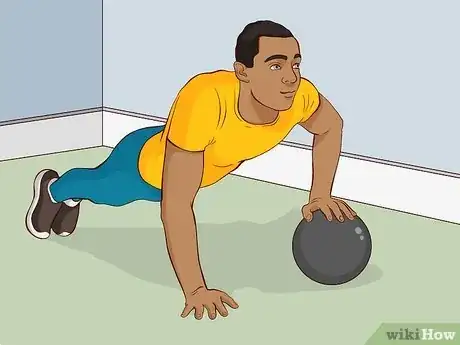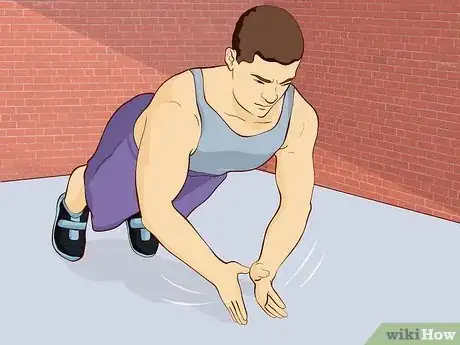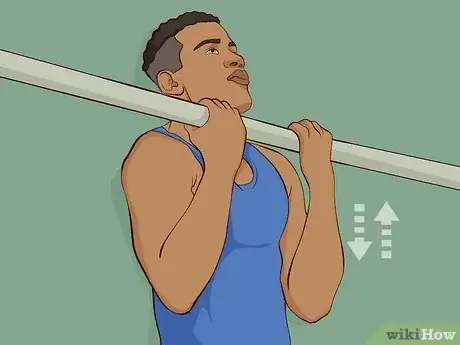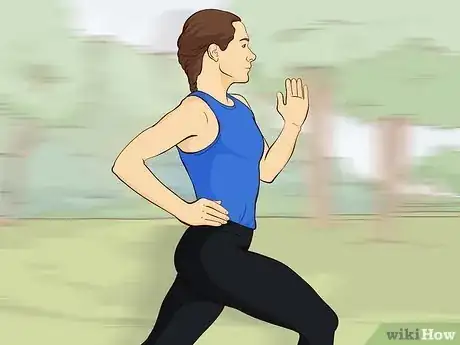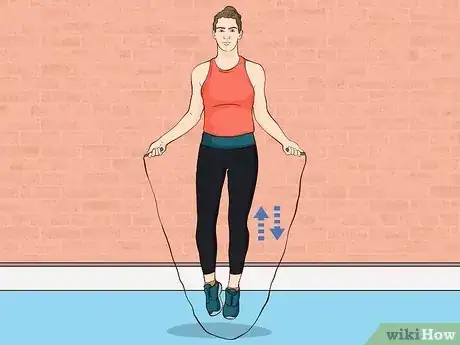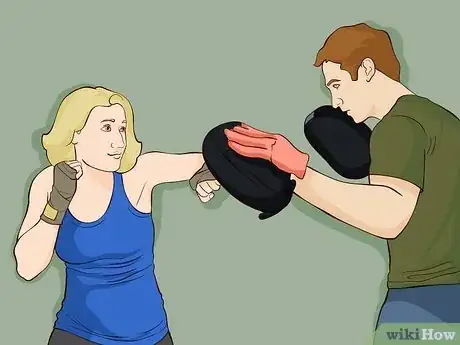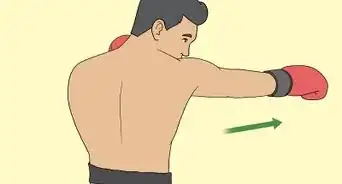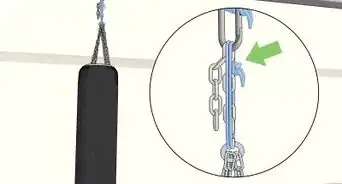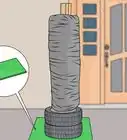This article was co-authored by David Engel. David Engel is a Muay Thai Instructor and Self Defense Trainer based in the San Francisco Bay Area. With over 15 years of martial arts instruction and training experience, David runs California Martial Athletics with co-owner Joe Chernay. He has created and maintained martial arts programs at Rise Combat Sports in San Francisco and Round 5 Martial Arts Academy in San Leandro, with a mission to provide students with a level of comfort and competency that manifests both within and outside the martial arts context. He is also a registered cornerman for amateur and pro competitors under the IKF (International Kickboxing Federation). David was the youngest apprentice instructor of the Thai Boxing Association of America under Ajarn Chai Sirisute (2009), and was a top-ranked amateur competitor in his weight class (127-130 lb) in California between 2013 and 2015.
There are 10 references cited in this article, which can be found at the bottom of the page.
wikiHow marks an article as reader-approved once it receives enough positive feedback. In this case, 100% of readers who voted found the article helpful, earning it our reader-approved status.
This article has been viewed 157,014 times.
The only way to develop speed when boxing is to train hard. Shadowboxing and working a punching bag are the best ways to build speed. Additionally, develop your upper body muscles with pushups, pullups, and jump-rope exercises. To test your speed development, try facing off against a sparring opponent.
Steps
Shadowboxing
-
1Assume the correct posture. To shadowbox, relax your body. Allow your shoulders to sag a bit. Do not clench your fist until right before you “land” the shadow punch.[1] Put your hands in front of your chest rather than near your face, as in a normal boxing stance. This will prevent you from getting stiff and wearing yourself out.[2]
-
2Shadowbox for nine minutes. If you feel yourself getting tired during your shadowboxing routine, relax your body and arms further. By shadowboxing for nine minutes, you’ll be able to develop speed when boxing for real.[3]Advertisement
-
3Use a variety of punches. Using a mixture of punches will closely simulate the type of activity you might experience when boxing in a fast-paced bout. For instance, throw basic jabs, triple jabs, crosses, hooks, and uppercuts. Training in this way will enable you to develop speed when boxing.[4]
-
4Add hand weights. Shadowboxing with a one or two-pound hand weight in each hand can help you get faster. Add hand weights to every other round of your shadowboxing routine. Work to maintain your regular speed when using hand weights. That way, when you go back to not using hand weights, you’ll be able to move even faster.[5]
- Adding hand weights will also help strengthen the muscles in your upper back and shoulders.
Using Punching Bags to Build Speed
-
1Punch for endurance. Have a partner hold a heavy punching bag on the opposite side from you. Punch the bag as many times as possible for 15-20 seconds. Rest for 15-20 seconds, then repeat eight to 10 times. Rest for 60 seconds, then do another round or two of endurance punching.[6]
- By punching the bag as much as possible during the endurance period, you can develop your speed when boxing.
-
2Punch the speedbag and double-end bag. A speedbag or double-end bag forces you to punch and react to the bag’s motion. Punching the speedbag and double-end bag can help you build arm and shoulder endurance. During your workouts, work the speed bag or double-end bag for three minutes nonstop, then rest for one minute. Repeat two or three times per workout.[7]
- When starting on the speedbag, hit it with the fronts and sides of your fists. Go slow and develop your rhythm, striking the bag as it bounces back toward you.
- As you get faster, add elbow strikes to your speedbag routine.
-
3Use a mixture of punches against the bag. To develop speed when boxing, you’ll need to develop speed on each type of punch. Therefore, when punching the bag, use all the types of punches you’d use in the ring and focus on throwing them as fast as possible.[8]
Using Resistance Training to Develop Muscles
-
1Do some extended pushups. Extended pushups, like regular pushups, begin by placing your hands shoulder-width apart on the ground and balancing your feet on the tips of your toes. But instead of lowering yourself until your elbows reach a 90-degree angle, lower yourself about 1/3 of the way down. Doing some extended pushups will build your triceps, which provide speed when boxing.[9]
- Any kind of pushup is going to be good for warming up for a fight or training session.[10]
-
2Do medicine ball pushups. Medicine ball pushups are the same as regular pushups except that you place one hand on a medicine ball. When you reach the top of the pushup, bring the hand that was not touching the medicine ball over to rest on it. Then, move the hand that was originally on the medicine ball onto the ground beside it. Perform 15 medicine ball pushups, then rest a few seconds, then repeat two more sets of 15.[11]
- These exercises can help you build muscles, which will allow you to develop speed when boxing.
-
3Do clapping pushups. Another way to improve speed when boxing is to do clapping pushups. These are like regular pushups, but require you to push off the ground with extra force, then clap your hands together, then place your hands on the ground again.[12]
- Clapping pushups demand a lot of power and speed. They can, therefore, help you develop speed when boxing.
-
4Do pullups. Pullups involve gripping a bar, then lifting your chin over the bar. From there, slowly lower yourself so that your arms bend at 90 degrees or more at the elbow. Doing pullups will develop your lats, which are crucial muscles in helping your quickly pull your fist back after throwing a punch.[13]
Developing Faster Footwork
-
1Perform short sprints. Go for a run. Alternate your regular jogging speed with explosive sprints. For instance, you might sprint from one streetlight to the next, then return to your regular jogging speed, then sprint again at the next streetlight, and so on.[14]
- Performing short sprints can train you to move faster. Moving faster can help you develop speed when boxing.
-
2Jump rope. There are many ways you can jump rope. A regular running-in-place jump style is the best way to start. You could also do double unders -- that is, swinging the rope beneath both legs twice before you touch the ground. To increase the speed even more, do some jump rope sprints by swinging the rope as fast as possible around your body. Any jump rope activity mode can improve your speed and agility.[15]
- Using a jump rope can improve speed when boxing because it triggers the shoulder’s fast-twitch muscle fibers.
-
3Spar with a partner. Sparring with a partner can help you improve reaction speed and lateral movement. It also provides another opportunity to practice throwing fast, accurate punches. A gym with a boxing ring is the best place to find a sparring partner.[16]
- Only spar with a partner under the supervision of a trained instructor.
Expert Q&A
-
QuestionHow can I get better at bobbing and weaving for boxing?
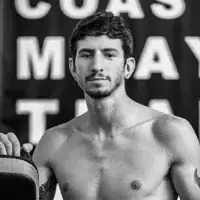 David EngelDavid Engel is a Muay Thai Instructor and Self Defense Trainer based in the San Francisco Bay Area. With over 15 years of martial arts instruction and training experience, David runs California Martial Athletics with co-owner Joe Chernay. He has created and maintained martial arts programs at Rise Combat Sports in San Francisco and Round 5 Martial Arts Academy in San Leandro, with a mission to provide students with a level of comfort and competency that manifests both within and outside the martial arts context. He is also a registered cornerman for amateur and pro competitors under the IKF (International Kickboxing Federation). David was the youngest apprentice instructor of the Thai Boxing Association of America under Ajarn Chai Sirisute (2009), and was a top-ranked amateur competitor in his weight class (127-130 lb) in California between 2013 and 2015.
David EngelDavid Engel is a Muay Thai Instructor and Self Defense Trainer based in the San Francisco Bay Area. With over 15 years of martial arts instruction and training experience, David runs California Martial Athletics with co-owner Joe Chernay. He has created and maintained martial arts programs at Rise Combat Sports in San Francisco and Round 5 Martial Arts Academy in San Leandro, with a mission to provide students with a level of comfort and competency that manifests both within and outside the martial arts context. He is also a registered cornerman for amateur and pro competitors under the IKF (International Kickboxing Federation). David was the youngest apprentice instructor of the Thai Boxing Association of America under Ajarn Chai Sirisute (2009), and was a top-ranked amateur competitor in his weight class (127-130 lb) in California between 2013 and 2015.
Muay Thai Instructor & Self Defense Trainer Good bob and weave really comes from having strong legs and good balance. So any plyometric work will be good for this. Jump squats, sprints, hill sprints, and skipping rope are all good for this. Jumping rope is especially good, since it will also help you develop balance too.
Good bob and weave really comes from having strong legs and good balance. So any plyometric work will be good for this. Jump squats, sprints, hill sprints, and skipping rope are all good for this. Jumping rope is especially good, since it will also help you develop balance too. -
QuestionWhat are the benefits of sparring?
 David EngelDavid Engel is a Muay Thai Instructor and Self Defense Trainer based in the San Francisco Bay Area. With over 15 years of martial arts instruction and training experience, David runs California Martial Athletics with co-owner Joe Chernay. He has created and maintained martial arts programs at Rise Combat Sports in San Francisco and Round 5 Martial Arts Academy in San Leandro, with a mission to provide students with a level of comfort and competency that manifests both within and outside the martial arts context. He is also a registered cornerman for amateur and pro competitors under the IKF (International Kickboxing Federation). David was the youngest apprentice instructor of the Thai Boxing Association of America under Ajarn Chai Sirisute (2009), and was a top-ranked amateur competitor in his weight class (127-130 lb) in California between 2013 and 2015.
David EngelDavid Engel is a Muay Thai Instructor and Self Defense Trainer based in the San Francisco Bay Area. With over 15 years of martial arts instruction and training experience, David runs California Martial Athletics with co-owner Joe Chernay. He has created and maintained martial arts programs at Rise Combat Sports in San Francisco and Round 5 Martial Arts Academy in San Leandro, with a mission to provide students with a level of comfort and competency that manifests both within and outside the martial arts context. He is also a registered cornerman for amateur and pro competitors under the IKF (International Kickboxing Federation). David was the youngest apprentice instructor of the Thai Boxing Association of America under Ajarn Chai Sirisute (2009), and was a top-ranked amateur competitor in his weight class (127-130 lb) in California between 2013 and 2015.
Muay Thai Instructor & Self Defense Trainer Sparring helps you improve your speed and the accuracy of your punches. It'll also help you improve your lateral movements.
Sparring helps you improve your speed and the accuracy of your punches. It'll also help you improve your lateral movements. -
QuestionHow do I make my punches faster?
 Community AnswerYou need to work on a speed bag, as well as developing more strength in your arms and wrists.
Community AnswerYou need to work on a speed bag, as well as developing more strength in your arms and wrists.
References
- ↑ https://www.myboxingcoach.com/improve-punch-speed/
- ↑ http://www.expertboxing.com/boxing-training/boxing-workouts/hand-speed-drills-and-exercises
- ↑ https://www.expertboxing.com/boxing-training/boxing-workouts/hand-speed-drills-and-exercises
- ↑ https://www.expertboxing.com/boxing-training/boxing-workouts/hand-speed-drills-and-exercises
- ↑ https://www.myboxingcoach.com/improve-punch-speed/
- ↑ http://www.expertboxing.com/boxing-training/boxing-workouts/hand-speed-drills-and-exercises
- ↑ https://www.expertboxing.com/boxing-training/boxing-workouts/hand-speed-drills-and-exercises
- ↑ https://www.expertboxing.com/boxing-training/boxing-workouts/hand-speed-drills-and-exercises
- ↑ https://www.expertboxing.com/boxing-training/boxing-workouts/hand-speed-drills-and-exercises
- ↑ David Engel. Muay Thai Instructor & Self Defense Trainer. Expert Interview. 5 May 2020.
- ↑ https://www.expertboxing.com/boxing-training/boxing-workouts/hand-speed-drills-and-exercises
- ↑ https://www.expertboxing.com/boxing-training/boxing-workouts/hand-speed-drills-and-exercises
- ↑ https://www.expertboxing.com/boxing-training/boxing-workouts/hand-speed-drills-and-exercises
- ↑ David Engel. Muay Thai Instructor & Self Defense Trainer. Expert Interview. 5 May 2020.
- ↑ https://www.bodybuilding.com/fun/a_totw24.htm
- ↑ David Engel. Muay Thai Instructor & Self Defense Trainer. Expert Interview. 5 May 2020.


